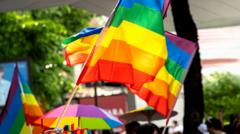Ghana's political landscape faces renewed tension as 10 MPs submit a controversial bill that threatens to impose strict penalties on LGBT individuals and their supporters. The proposed law, which was previously halted by former president Akufo Addo, faces fierce opposition from human rights advocates and poses significant economic risks for the nation.
Ghana's MPs Push for Stringent Anti-LGBT Legislation Amid Backlash

Ghana's MPs Push for Stringent Anti-LGBT Legislation Amid Backlash
A group of Ghanaian lawmakers has reintroduced a polarizing anti-LGBT bill aimed at imposing severe punishments on queer identities and advocacy.
A coalition of 10 members from Ghana's parliament has reignited the debate surrounding LGBT rights by resubmitting an extreme anti-LGBT bill. If enacted, the law would impose a three-year prison sentence for individuals identifying as gay and a five to ten-year sentence for those who promote or advocate for LGBT rights. The bill, initially approved by parliament in the prior session, was not signed into law by the former president due to legal concerns.
Caught in controversy, the new legislation has drawn widespread condemnation from human rights organizations, who describe it as excessively punitive. "The anti-LGBT rights bill starkly contradicts Ghana's values of peace and toleration," said Larissa Kojoué, a researcher with Human Rights Watch. “Its implementation could not only undermine legal integrity in Ghana but potentially incite violence against LGBT individuals and their allies."
President John Dramani Mahama has acknowledged the need for broader consultation, indicating that the bill could benefit from governmental endorsement to better facilitate dialogue among stakeholders. Despite resistance, proponents of the bill argue it is essential for safeguarding what they consider traditional Ghanaian cultural and familial integrity.
The bill's revival raises grave concerns regarding Ghana's economy. Former finance minister projections suggest that passing the legislation could jeopardize up to $3.8 billion in World Bank development funding, potentially affecting the $3 billion IMF assistance plan. Opposition legislator John Ntim Fordjour, however, argues that the political climate, especially with the US election results, has skewed in favor of conservative policies.
Originally unveiled in 2021, the bill has faced numerous delays, raising questions about its future in the newly seated parliament. Activists, like trans woman Va-Bene Elikem Fiatsi, expressed disappointment but remain committed to fighting for LGBT rights in Ghana despite the daunting atmosphere the proposed legislation creates. As the situation develops, the potential socio-economic ramifications and human rights implications of the bill will remain critical points of discussion.






















